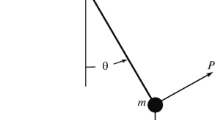Abstract
Sufficient conditions for the terminal invariance of nonlinear dynamic stochastic controlled systems (jump diffusions) are formulated and proved. The jump component has the form of an integral over a random Poisson measure. The parameters of this measure (the intensity and distribution of the values of jumps) are assumed to change over time. The conditions of invariance with respect to perturbations for a given initial state and also the conditions of absolute invariance (which ensure the constancy of a terminal criterion for any initial state) are proposed. The results are applied to a number of model examples, which include the numerical simulation and analytical study of the designed terminally invariant dynamic systems.






Similar content being viewed by others
References
Rozonoer, L. I. A Variational Approach to the Problem of Invariance of Automatic Control Systems. Autom. Remote Control 24(no. 6), 680–743 (1963). ; no. 7, pp. 793–800.
Khrustalev, M. M. Necessary and Sufficient Conditions of Invariance. Autom. Remote Control 29(no. 4), 540–544 (1968).
Khrustalev, M. M. Metody teorii invariantnosti v zadachakh sinteza zakonov terminalanogo upravleniya letatelanymi apparatami (Methods of Invariance Theory in Terminal Control Design Problems for Aircrafts). (Mosk. Aviats. Inst, Moscow, 1987).
Khrustalev, M. M., Plotnikov, Ju. P. & Belov, V. A. The Invariant Control of Vehicle Descent into the Atmosphere. Acta Astronautica no. 5-6, 357–367 (1976).
Khrustalev, M.M.Weak Invariance of Stochastic Diffusion Systems, Tr. XI Mezhdun. Chetaevskoi Konf. "Analiticheskaya mekhanika, ustoichivost’ i upravlenie” (Proc. XI Int. Chetaev Conf. "Analytical Mechanics, Stability, and Control”), vol. 3, part III, Kazan: Kazansk. Issled. Tekh. Univ. (Kazansk. Aviats. Inst.), 2017, pp. 171–177.
Khrustalev, M. M. Invariance of Stochastic Diffusion Systems. Dokl. Math. 96(no. 2), 535–537 (2017).
Khrustalev, M. M. Terminal Invariance of Stochastic Diffusion Systems. Autom. Remote Control 79(no. 8), 1434–1449 (2018).
Khrustalev, M.M.Terminal Invariance of Linear Stochastic Diffusion Systems, Tr. 13 Vseross. soveshchaniya po problemam upravleniya (VSPU-XIII) (Proc. 13 All-Russian Meeting on Control Problems (AMCP-13)), Moscow: Inst. Problem Upravlen., 2019, pp. 1305–1309.
Korolyuk, V. S., Portenko, N. I., Skorokhod, A. V. & Turbin, A. F. Spravochnik po teorii veroyatnostei i matematicheskoi statistike (Handbook of Probability Theory and Mathematical Statistics). (Nauka, Moscow, 1985).
Øksendal, B. & Sulem, A. Applied Stochastic Control of Jump Diffusions. (Springer, Berlin-Heidelberg, 2005).
Rybakov, K.A.Sufficient Conditions of Optimality in a Control Problem for Jump Diffusion Systems, Tr. Vseross. soveshchaniya po problemam upravleniya (VSPU-2014) (Proc. All-Russian Meeting on Control Problems (AMCP-2014)), Moscow: Inst. Problem Upravlen., 2014, pp. 734–744.
Averina, T. A. & Rybakov, K. A. Two Methods for Analysis of Stochastic Systems with Poisson Component. Differ. Uravn. Protsessy Upravlen. no. 3, 85–116 (2013).
Paraev, Yu. I. Vvedenie v statisticheskuyu dinamiku protsessov upravleniya i filatratsii (Introduction to Statistical Dynamics of Control and Filtering Processes). (Sovetskoe Radio, Moscow, 1976).
Platen, E. & Bruti-Liberati, N. Numerical Solution of Stochastic Differential Equations with Jumps in Finance. (Springer, Berlin-Heidelberg, 2010).
Yin, G. & Zhu, C. Hybrid Switching Diffusions. (Springer, New York, 2010).
Karachanskaya, E. V. The Generalized Itô-Venttsel’ Formula in the Case of a Noncentered Poisson Measure, a Stochastic First Integral, and a First Integral. Sib. Adv. Math. 25, 99–122 (2015).
Miller, B. M. & Pankov, A. R. Teoriya sluchainykh protsessov v primerakh i zadachakh (Theory of Random Processes in Examples and Problems). (Fizmatlit, Moscow, 2002).
Gikhman, I. I. & Skorokhod, A. V. Stokhasticheskie differentsial’nye uravneniya. (Naukova Dumka, Kiev, 1968). Translated under the title Stochastic Differential Equations, Berlin–Heidelberg: Springer-Verlag, 1972.
Author information
Authors and Affiliations
Appendices
Appendix
Before proceeding to the substantiation of the results obtained in this paper, present the following proposition without proof.
Proposition 1
Due to Definitions 1and 2and the notations (5)–(10), for any initial condition (t0, x0) ∈ B0, any function φ(⋅) ∈ Φ, and any time instant t ∈ [t0, tF], the Itô formula [9, 10, 13, 18]
or equivalently,
holds with probability 1 on the set D(t0, x0).
The rationale for Proposition 1 can be found in [10, 13]; its rigorous proof, in [18]. The following proofs are based on this proposition and, in the rest of their parts, practically repeat the ones from [7]. Therefore, they are presented here in a rather short form.
Proof of Theorem 1. Let a point (t0, x0) ∈ B0 be fixed. Due to conditions (ii)–(iv) of the theorem, the Itô formula (A.2) leads to the equality
holding almost surely on D(t0, x0). In particular, for t = tF, condition (i) implies the relation (11). As a result, by Definition 3 the system (1) is invariant with respect to perturbations.
Proof of Theorem 2. Let a point (t0, x0) ∈ B0 be arbitrary. Due to conditions (iii)–(v) of the theorem, the Itô formula (A.1) leads to the equality
holding almost surely on D(B0) and almost everywhere on [tS, tF]. This equality represents an ordinary differential equation for the function φ*(t): = φ(t, x(t)) with an arbitrary initial condition φ*(t0) = φ(t0, x0) at an arbitrary initial point t0. This equation has the solution [7] of the form
on the interval [t0, tF). It can be demonstrated (see [7, Lemma 1]) that for t = tF, due to condition (i) of the theorem, this solution admits of the continuous extension
Hence, condition (ii) implies the relation (12), and the system (1) is absolutely invariant by Definition 4.
Funding
This work was supported in part by the Russian Foundation for Basic Research, project no. 20-08-00400.
Rights and permissions
About this article
Cite this article
Khrustalev, M., Tsarkov, K. Sufficient Conditions for Terminal Invariance of Stochastic Jump Diffusion Systems. Autom Remote Control 81, 2062–2077 (2020). https://doi.org/10.1134/S0005117920110089
Received:
Revised:
Accepted:
Published:
Issue Date:
DOI: https://doi.org/10.1134/S0005117920110089



